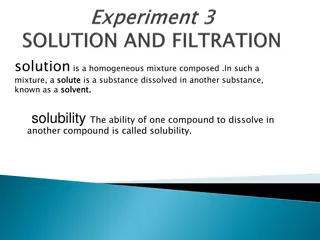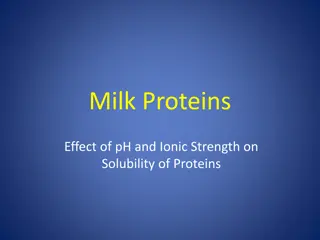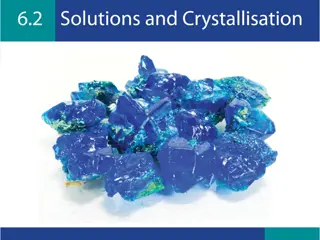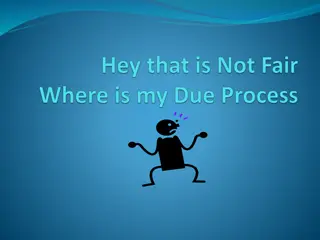Solubility Rules from the University of South Carolina
This resource outlines the solubility rules for various compounds based on their chemical properties. It explains the solubility of compounds of alkali metals, ammonium salts, nitrates, chlorides, sulfates, and more. The rules provide insights into which compounds are soluble or insoluble in aqueous solutions, helping in understanding their behavior. These rules are helpful in predicting the formation of precipitates and the behavior of compounds in solution.
Download Presentation

Please find below an Image/Link to download the presentation.
The content on the website is provided AS IS for your information and personal use only. It may not be sold, licensed, or shared on other websites without obtaining consent from the author.If you encounter any issues during the download, it is possible that the publisher has removed the file from their server.
You are allowed to download the files provided on this website for personal or commercial use, subject to the condition that they are used lawfully. All files are the property of their respective owners.
The content on the website is provided AS IS for your information and personal use only. It may not be sold, licensed, or shared on other websites without obtaining consent from the author.
E N D
Presentation Transcript
Solubility Rules FROM THE UNIVERSITY OF SOUTH CAROLINA STEPHEN L. MORGAN HTTP://WWW.CHEM.SC.EDU/FACULTY/MORGAN/RESOURCES/SOLUBILITY/
Rule 1. All compounds of Group IA elements (the alkali metals) are soluble. For example, NaNO3, KCl, and LiOH are all soluble compounds. This means that an aqueous solution of KCl really contains the predominant species K+and Cl-and, because KCl is soluble, no KCl is present as a solid compound in aqueous solution: KCl(s)=> K+(aq.)+ Cl-(aq.)
Rule 2. All ammonium salts (salts of NH4+) are soluble. For example, NH4OH is a soluble compound. Molecules of NH4OH completely dissociate to give ions of NH4+and OH-in aqueous solution.
Rule 3. All nitrate (NO3-), chlorate (ClO3-), perchlorate (ClO4-), and acetate (CH3COO-or C2H3O2-, sometimes abbreviated as Oac-) salts are soluble. For example, KNO3would be classified as completely soluble by rules 1 and 3. Thus, KNO3could be expected to dissociate completely in aqueous solution into K+and NO3- ions: KNO3=> K+(aq.) + NO3-(aq.)
Rule 4. All chloride (Cl-), bromide (Br-), and iodide (I-) salts are soluble except for those of Ag+, Pb2+, and Hg22+. For example, AgCl is a classic insoluble chloride salt: AgCl(s)<=> Ag+(aq.)+ Cl-(aq.)(Ksp= 1.8 x 10-10). Note: A substance's solubility product, Ksp, is the mathematical product of its dissolved ion concentrations raised to the power of their stoichiometric coefficients. Solubility products are relevant when a sparingly soluble ionic compound releases ions into solution. A solubility product is a specific form of an equilibrium constant. Solubility products change with temperature, so the temperature at which a solubility product was measured must always be quoted.
Rule 5. All sulfate ( SO4=) compounds are soluble except those of Ba2+, Sr2+, Ca2+, Pb2+, Hg22+, and Hg2+, Ca2+and Ag+sulfates are only moderately soluble. For example, BaSO4is insoluble (only soluble to a very small extent): BaSO4(s)<=> Ba2+(aq.)+ SO42-(aq.)(Ksp= 1.1 x 10-10). Na2SO4is completely soluble: Na2SO4(s)=> 2 Na+(aq.)+ SO42-(aq.).
Rule 6. All hydroxide (OH-) compounds are insoluble except those of Group I-A (alkali metals) and Ba2+, Ca2+, and Sr2+. For example, Mg(OH)2is insoluble (Ksp= 7.1 x 10- 12). NaOH and Ba(OH)2are soluble, completely dissociating in aqueous solution: NaOH(s)=> Na+(aq.)+ OH-(aq.), a strong base Ba(OH)2(s)=> Ba2+(aq.)+ 2OH-(aq.)(Ksp= 3 x 10-4)
Rule 7. All sulfide (S2-) compounds are insoluble except those of Groups I-A and II-A (alkali metals and alkali earths). For example, Na2S(s)<=> 2Na+(aq.)+ S2-(aq.) MnS is insoluble (Ksp= 3 x 10-11).
Rule 8. All sulfites (SO3=), carbonates (CO3=), chromates (CrO4=), and phosphates (PO43-) areinsoluble except for those of NH4+and Group I-A (alkali metals)(see rules 1 and 2). For example, calcite, CaCO3(s)<=> Ca2+(aq.)+ CO3=(aq.)(Ksp= 4.5 x 10-9).
You Tube Videos to Help you Remember https://www.youtube.com/watch?v=AsCLuLS-yZY - Mnemonic https://www.youtube.com/watch?v=slf8w2DHH9Y Song https://www.youtube.com/watch?v=dCIRAPzHTfA Just the Rules























